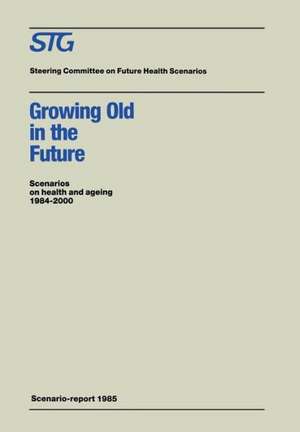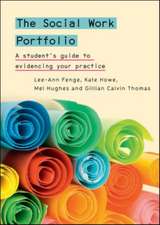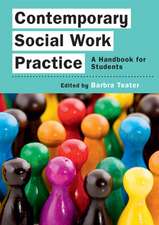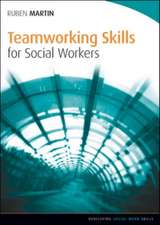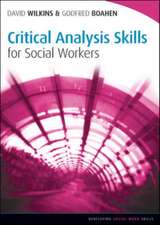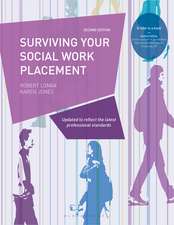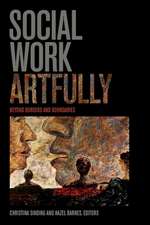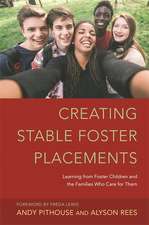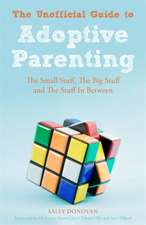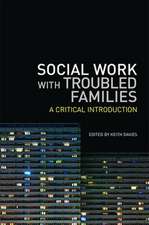Growing Old in the Future: Scenarios on health and ageing 1984–2000: Future Health Scenarios
Autor Steering Committee on Future Health Scenarios C.F. Hollander Contribuţii de Henk A. Beckeren Limba Engleză Paperback – 31 mai 1987
Din seria Future Health Scenarios
- 5%
 Preț: 1405.13 lei
Preț: 1405.13 lei - 5%
 Preț: 1406.58 lei
Preț: 1406.58 lei - 5%
 Preț: 1410.80 lei
Preț: 1410.80 lei - 5%
 Preț: 369.84 lei
Preț: 369.84 lei - 5%
 Preț: 1413.93 lei
Preț: 1413.93 lei - 5%
 Preț: 1408.80 lei
Preț: 1408.80 lei - 5%
 Preț: 1414.29 lei
Preț: 1414.29 lei - 5%
 Preț: 1087.31 lei
Preț: 1087.31 lei - 5%
 Preț: 1085.29 lei
Preț: 1085.29 lei - 5%
 Preț: 1088.24 lei
Preț: 1088.24 lei - 5%
 Preț: 1081.26 lei
Preț: 1081.26 lei - 5%
 Preț: 717.73 lei
Preț: 717.73 lei - 5%
 Preț: 1084.93 lei
Preț: 1084.93 lei - 5%
 Preț: 1413.16 lei
Preț: 1413.16 lei - 5%
 Preț: 1415.01 lei
Preț: 1415.01 lei - 5%
 Preț: 711.15 lei
Preț: 711.15 lei - 5%
 Preț: 350.56 lei
Preț: 350.56 lei - 5%
 Preț: 723.93 lei
Preț: 723.93 lei - 5%
 Preț: 376.06 lei
Preț: 376.06 lei - 28%
 Preț: 426.87 lei
Preț: 426.87 lei
Preț: 948.16 lei
Preț vechi: 1156.29 lei
-18% Nou
Puncte Express: 1422
Preț estimativ în valută:
181.43€ • 190.11$ • 149.98£
181.43€ • 190.11$ • 149.98£
Carte tipărită la comandă
Livrare economică 11-25 aprilie
Preluare comenzi: 021 569.72.76
Specificații
ISBN-13: 9780898388695
ISBN-10: 0898388694
Pagini: 305
Ilustrații: 305 p. 2 illus.
Dimensiuni: 178 x 254 x 17 mm
Greutate: 0.52 kg
Ediția:Softcover reprint of the original 1st ed. 1987
Editura: SPRINGER NETHERLANDS
Colecția Springer
Seria Future Health Scenarios
Locul publicării:Dordrecht, Netherlands
ISBN-10: 0898388694
Pagini: 305
Ilustrații: 305 p. 2 illus.
Dimensiuni: 178 x 254 x 17 mm
Greutate: 0.52 kg
Ediția:Softcover reprint of the original 1st ed. 1987
Editura: SPRINGER NETHERLANDS
Colecția Springer
Seria Future Health Scenarios
Locul publicării:Dordrecht, Netherlands
Public țintă
ResearchCuprins
Summary.- 1 Introduction.- 1.1 Background.- 1.2 Design and course of the scenario project on ageing.- 1.3 Taking a further look at scenarios.- 1.4 Design of the report.- 2 Scenario A: The reference scenario.- 2.1 Introduction.- 2.2 Demographic developments.- 2.3 The state of health of the elderly.- 2.4 Social developments.- 2.5 The demand for (health) care facilities.- 2.6 The economic context.- 3 Medical and medical-technological developments.- 3.1 Introduction.- 3.2 Expectations with respect to medicine and pharmacology.- 3.3 Expectations with respect to technology.- 3.4 Towards a second medical revolution?.- 3.5 Expectations with respect to cell biology.- 3.6 Concluding remarks.- 4 Scenario B: Increasing growth in demand for facilities.- 4.1 Introduction.- 4.2 Social developments as they affect the health situation.- 4.3 Consequences for facilities.- 4.4 The economic context.- 5 Scenario C: Decreasing growth in demand for facilities.- 5.1 Introduction.- 5.2 Social developments as they affect the health situation.- 5.3 Developments relating to facilities for the elderly.- 5.4 The economic context.- 6 Disturbing developments.- 6.1 Introduction.- 6.2 Postponement of dementia.- 6.3 Extreme decrease in intergenerational solidarity.- 6.4 Intersecting developments in relation to the scenarios.- 7 Application possibilities for scenarios.- 7.1 Introduction.- 7.2 Scenarios as ‘learning environments’.- 7.3. Scenarios and health care facilities for the elderly.- 7.4 A closer look at putting the scenario report to active use.- 7.5 Concluding remarks.- Appendices.
